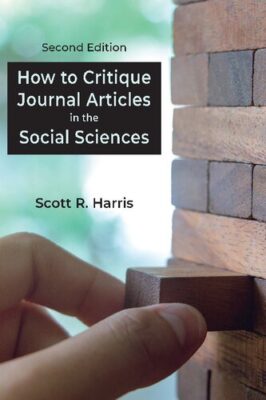How to Critique Journal Articles in the Social Sciences 2nd Edition
Pdf Book Name: How to Critique Journal Articles in the Social Sciences 2nd Edition
Author: Scott R Harris
Publisher:
ISBN-10, 13: 1478646926,9781478646921
Year: 2022
Pages: 147 Pages
Language: English
File size: 6 MB
File format: PDF,EPUB

How to Critique Journal Articles in the Social Sciences 2nd Edition
Books Details:
Critiquing journal articles in the social sciences requires a systematic approach to evaluate the research, methodology, and conclusions drawn by the authors. Here’s a structured guide based on a hypothetical “How to Critique Journal Articles in the Social Sciences, 2nd Edition”:
### How to Critique Journal Articles in the Social Sciences
—
#### **1. Understanding the Structure of a Journal Article**
– **Abstract**: Summary of the study; provides key insights into the purpose and findings.
– **Introduction**: Contextualizes the research problem and outlines objectives and hypotheses.
– **Literature Review**: Reviews existing research; identifies gaps the current study addresses.
– **Methodology**: Describes research design, participants, data collection, and analysis methods.
– **Results**: Presents findings, usually with tables and figures.
– **Discussion/Conclusion**: Interprets results, discusses implications, and suggests future research.
#### **2. Initial Read**
– **Skim for Main Ideas**: Read the abstract, introduction, and conclusion to grasp the study’s essence.
– **Identify the Research Question**: What specific issue is the article addressing?
#### **3. Detailed Analysis**
– **Literature Review Evaluation**:
– Are the references current and relevant?
– Does the review adequately cover the topic?
– **Methodology Critique**:
– **Design**: Is the research design appropriate (e.g., qualitative, quantitative, mixed methods)?
– **Sample**: Is the sample size adequate? Is it representative of the population?
– **Data Collection**: Are the methods for data collection valid and reliable?
– **Ethics**: Were ethical considerations addressed (e.g., informed consent)?
– **Results Assessment**:
– Are the results clearly presented?
– Do the results logically follow from the methods used?
– Are statistical analyses appropriate and correctly interpreted?
– **Discussion and Conclusion**:
– Do the authors effectively relate their findings to the research question?
– Are limitations acknowledged?
– Are practical implications discussed?
#### **4. Critical Perspective**
– **Strengths**: What are the strong points of the study? (e.g., robust methodology, significant findings)
– **Weaknesses**: Identify any flaws or areas for improvement (e.g., bias, gaps in data).
– **Originality**: Does the study contribute new knowledge to the field?
#### **5. Writing Your Critique**
– **Introduction**: Summarize the article and its significance.
– **Body**:
– Discuss the strengths and weaknesses identified in each section (literature review, methodology, results, discussion).
– Use evidence from the article to support your points.
– **Conclusion**: Summarize your overall evaluation and suggest areas for future research or improvements.
#### **6. Tips for Effective Critiquing**
– **Be Objective**: Focus on the content and methodology, not personal opinions about the authors.
– **Use Clear Language**: Avoid jargon; aim for clarity in your writing.
– **Support Claims**: Back up your critiques with evidence from the article and other scholarly sources.
—
### Additional Resources
– **Guides on Research Methods**: Familiarize yourself with different research methodologies.
– **Statistical Analysis Texts**: Understand common statistical methods used in social science research.
– **Peer Review Resources**: Explore guidelines from academic journals on what constitutes a good critique.
This framework can help you systematically evaluate social science journal articles and articulate your critiques clearly and effectively. If you need specific examples or further elaboration on any section, let me know!
DMCA Disclaimer: This site complies with DMCA Digital Copyright Laws. Please bear in mind that we do not own copyrights to these books. We’re sharing this material with our audience ONLY for educational purpose. We highly encourage our visitors to purchase original books from the respected publishers. If someone with copyrights wants us to remove this content, please contact us immediately. All books on the edubookpdf.com are free and NOT HOSTED ON OUR WEBSITE. If you feel that we have violated your copyrights, then please contact us immediately (click here).



